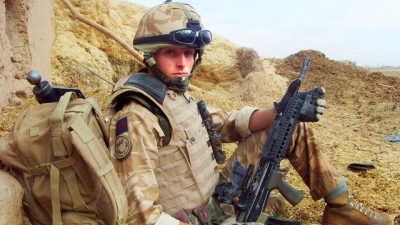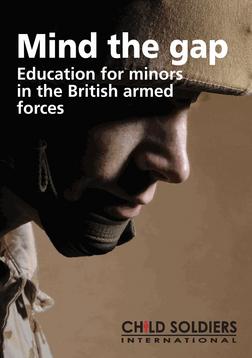Found 435 Results
Page 27 of 32
ForcesWatch briefing: Expanding the Cadets and ‘military ethos’ in UK schools
04/12/2012

A ForcesWatch briefing on the Government policy of expanding cadets and promoting ‘military skills and ethos’ in schools.
We shall reach them in the classrooms: promoting a ‘military ethos’ in schools
28/11/2012
Earlier this month the Department for Education published a statement on their website outlining their ambition to promote a military ethos in schools across the country. Through developing projects such as Troops to Teachers and expanding schemes such as the cadets and other alternative military provision in schools (such as Challenger Troop), the government is now actively encouraging schools, especially newer Academies and Free Schools, which tend to exist in more disadvantaged areas, to foster a military ethos. This article was originally published on Bright Green
Militarising Education
27/11/2012
This article was originally published on openDemocracy
The incursion of the military into the British education system will mean that alternatives to war and peaceful ways of resolving conflict will be more difficult for young people to explore. In the long term we will all pay a heavy price.
Judge fears ‘Deepcut’ culture remains after ‘cover up’ of army recruit sexual abuse
Military staff have failed to learn the lessons of the Deepcut Review and continue to turn a blind eye to the bullying and abuse of young recruits, a judge has claimed.
“It’s not a game”
26/11/2012

Each of the episodes from both series of Our War focuses on a different platoon or company, with varying missions during their tours in Helmand Province (which dated from between 2006 and 2012). Common themes to each of them include the youth of those involved, and the gravity of what is being asked of them.
Recruiting officers told not to warn would-be soldiers about true horrors of Army life
14/11/2012
Recruiters who refused to hide the truth were sent back to their barracks to face disciplinary action.
Critical portrayals of life in the armed forces in two West End plays
19/10/2012

There are two plays on in London’s West End currently that depict life in the UK military, and they do so critically. Our Boys‘, by Jonathan Lewis, at the Duchess Theatre is a revival, having first been performed in 1993. Sandi Toksvig’s Bully Boy is at the St James Theatre. There is considerable similarity in the themes of the two plays: why young men join the armed forces, how they are often neglected when injured, and the horror of contemporary war in general.
Recently….on the Olympics, strike-breaking and the armed forces
17/10/2012
In an article called ‘Olympic Medals for the Military’, Professor Michael Clarke, director-general of the Royal United Services Institute argues that the involvement of the military in the Olympics will bring in “a new relationship between the Armed Forces and the general public”, in which the former appear “a normal and average part of a relaxed and self-confident British society.” Is normalisation of the military within everyday life a good thing? Is it the mark of a “self-confident British society” or would a better indicator of that be a far less visible presence of the military?
Mind the Gap: Education for minors in the British armed forces
28/09/2012

Published by Child Soldiers International.
This report concludes that the impact of recruitment below the age of 18 opens up a number of gaps that have long term significance, not only for the armed forces but also for the young people that they recruit. At a time of considerable downsizing of the army in particular, the large gap between the cost of training minors (who cannot be deployed operationally) and adults (who can) is difficult to sustain. But perhaps the most significant cost is in the detrimental impact that the gaps identified have on the future prospects of minors recruited by our armed forces.
Recently… on militainment
18/09/2012
A recent article called The Morning After: Unfriendly Fire by James Poniewozik in Time Magazine critiques a new reality TV show from the US TV channel NBC. Stars Earn Stripes, “in which celebrities are paired with soldiers to carry out special-forces-type maneuvers, was denounced by nine Nobel laureates, including South African bishop Desmond Tutu, for glamourising war and its violence by making them into entertainment.”
Sexual assault and bullying in the armed forces
17/09/2012
A parliamentary question reveals that during 2011 there were 228 allegations of bullying or harassment reported to the Service Complaints Commissioner. Another parliamentary question has identified that ‘Over the past two and a half years, there have been 53 reported rapes and 86 reported sexual assaults in the Army, the Navy and the Air Force (one per week). Labour MP Madeleine Moon said she was concerned there was a ‘culture of silence’, with hundreds of victims never reporting attacks.
One sex attack reported by Armed Forces every week… but real figure could be much higher
27/08/2012
One rape or sexual assault is reported by members of the Armed Forces every week. The MP who released the figures believes they could be a huge underestimate, with the true figures closer to an attack a day.
Labour plan to set up ‘Service Schools’ staffed by soldiers
17/07/2012
A new generation of “Service Schools” staffed entirely by former members of the Armed Forces could be set up across Britain under Labour plans to raise education standards, it has emerged.
Service Schools and more cadet forces – an exercise in recruitment
Over the past month, amid announcements of major cuts to the armed forces, came some unexpected news on public spending: £10.85million to expand cadet forces into state schools, a £1million grant to promote a military ethos in schools and senior Labour politicians calling for a series of ‘Service Schools’, staffed entirely by former members of the armed forces, to be established. Unexpected, that is, to anyone who hasn’t previously been aware of the importance that military policy makers place on access to young people within education.
Page 27 of 32
